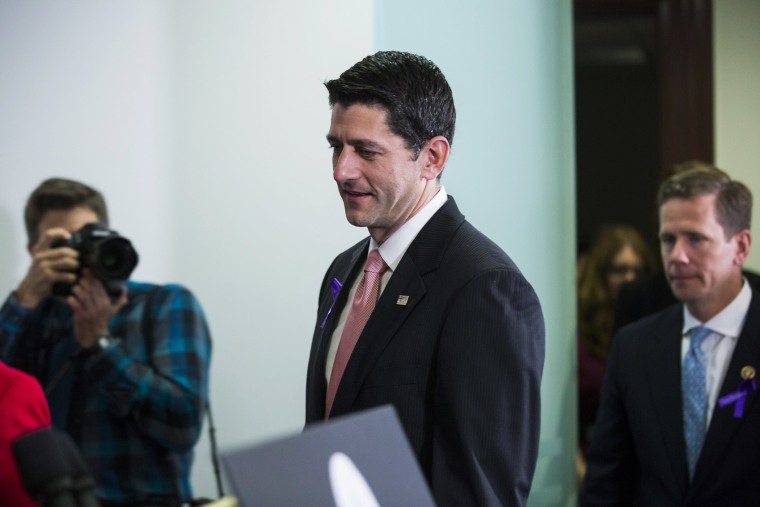Donald Trump's whirlwind series of meetings Thursday on Capitol Hill with top GOP officials, including House Speaker Paul Ryan, didn't result in a complete healing in the rift between the presumptive nominee and some GOP leaders.
Yet both sides hailed the trip as productive.
The meetings were closed to the media, but here are four things we learned from the reactions to the high-profile visit:
1. The speaker and the candidate have real differences
The most clear and important fact after Thursday's meetings is that Ryan still won't publicly endorse Trump, the man who defeated 16 other candidates to emerge as the favorite of Republican voters. This is highly unusual. If Bernie Sanders quits the Democratic presidential race and Hillary Clinton is the only remaining candidate, it is very likely House Democratic Leader Nancy Pelosi will endorse Clinton quickly.
RELATED: Donald Trump and Paul Ryan could not be further apart
But Ryan is requiring that Trump work for his support. After the two had a meeting on Thursday morning that Republican National Committee Chairman Reince Priebus also attended, Trump and Ryan issued a joint statement with the kind of precise, careful wording that the White House uses when describing President Obama's conversations with world leaders:
The United States cannot afford another four years of the Obama White House, which is what Hillary Clinton represents. That is why it's critical that Republicans unite around our shared principles, advance a conservative agenda, and do all we can to win this fall. With that focus, we had a great conversation this morning. While we were honest about our few differences, we recognize that there are also many important areas of common ground. We will be having additional discussions, but remain confident there's a great opportunity to unify our party and win this fall, and we are totally committed to working together to achieve that goal. We are extremely proud of the fact that many millions of new voters have entered the primary system, far more than ever before in the Republican Party's history. This was our first meeting, but it was a very positive step toward unification.
2. The differences are about tone as much as policy
Ryan, in a briefing with reporters after the meeting, said that he and Trump "exchanged differences of opinion on a number of things that, you know, everybody knows we have."
Ryan did not spell out these differences.
Ryan does not support Trump's proposals for a border wall dividing the United States from Mexico or a temporary ban on Muslims.
In some ways, Trump is to the right of the GOP's establishment wing on some border and security issues, but to its left on economics.
"I represent a wing of a conservative party, you could say. He brings -- he's bringing a whole new wing to it. He's bringing new voters that we've never had for decades. That's a positive thing," Ryan said.
More importantly, Ryan may have overstated the importance of actual policy issues in the impasse between Trump and the more establishment wing of the GOP. In interviews and in their public comments, many Republicans are more opposed to Trump's tone than his ideas. What they want, more than any policy shift, is for the real estate mogul to assure them that he will no longer make controversial, inflammatory comments, particularly about women and people of color.
Ryan alluded to this question of tone as well, telling reporters that he is trying to figure out how Trump and other Republicans can, "keep adding and adding voters while not subtracting any voters."
3. This impasse could be brief and insignificant by Election Day
Ryan, in his comments on Thursday, hinted at what he might say if he endorses Trump later this year. The real estate mogul, the speaker noted, won an overwhelming number of votes in the primary process. Trump is the champion of a distinct wing of the Republican Party, and Ryan indicated he could respect the choice of those Republicans, even if Ryan is not himself in the Trump wing. And as the pair's joint statement said, "The United States cannot afford another four years of the Obama White House, which is what Hillary Clinton represents."
And Trump, in appealing to fellow Republicans, got an unexpected boost this week: polling results from Quinnipiac University released on Tuesday. While some analysts have disputed the polls' results, Quinnipiac found Trump effectively tied with Hillary Clinton in Florida, Ohio and Pennsylvania. In interviews, several Republican members, including Senate Majority Leader Mitch McConnell, pointed at these numbers as evidence that Trump is not guaranteed to lose this fall and drag down other Republicans with him.
"If we've learned anything from the election thus far, it's that voters, especially those in the GOP, don't care much what the establishment thinks," The Cook Political Report's Amy Walter wrote this week, in a piece titled "The Ryan/Trump Battle Is Less Important Than It Looks."
"Party leaders, think tanks and intellectuals care about the philosophical underpinnings of the party and its ultimate future," she added. "Rank and file voters aren't as interested in dire warning about the "end of the Republican party." They are focused on 2016 and beating Hillary Clinton.
4. No matter what Congressional Republicans do, Democrats are going to cast them as the 'Party of Trump'
Dealing with Trump is complicated for Republicans like Ryan. The speaker, in his briefing with reporters, kept referring to his sessions with Trump as "encouraging," as if he and his staff thought carefully about his word choices.
Democrats aren't being as polite. With Trump on the Hill, they were eager not only to bash Trump, but link him to the broader GOP.
By "embracing Trump, you can only assume he agrees with Trump's view that women are dogs and pigs," Reid said on the floor of the Senate Thursday, referring to McConnell.
This article originally appeared on NBCNews.com.
